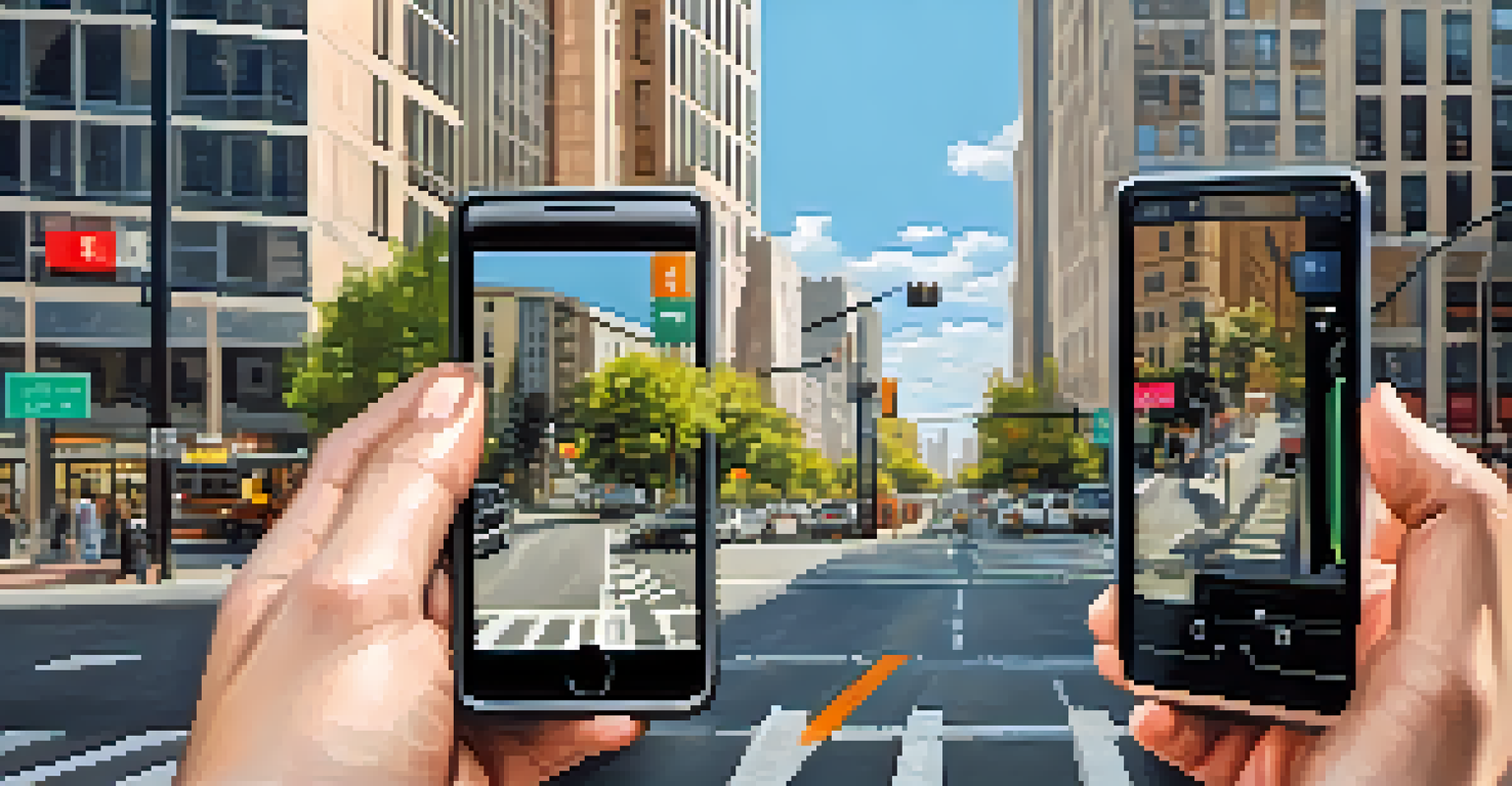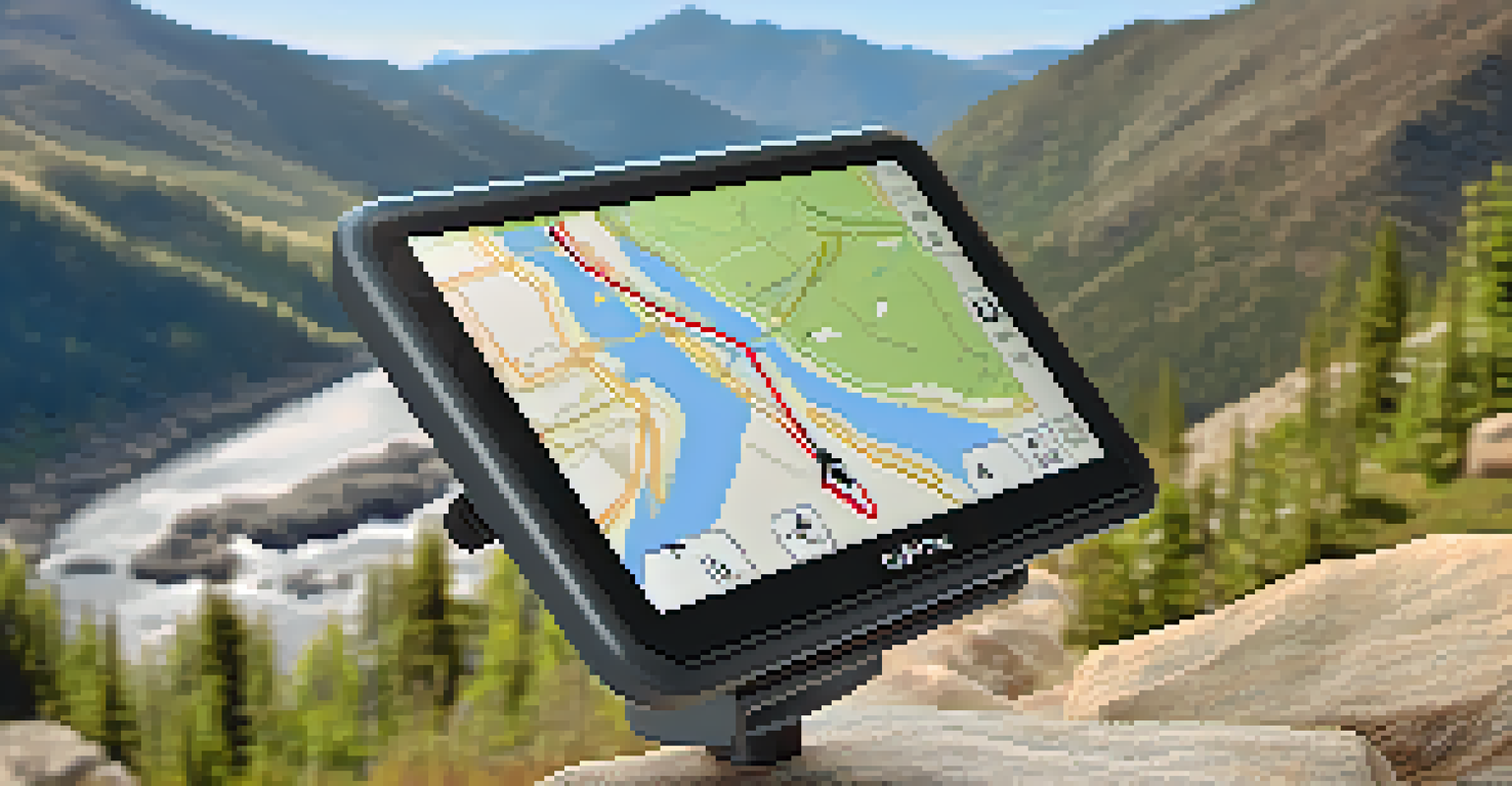How GPS Technology Revolutionizes Modern Travel

Understanding GPS: The Backbone of Modern Navigation
Global Positioning System (GPS) technology is a satellite-based navigation system that allows users to determine their exact location anywhere on Earth. It works by communicating with a network of satellites that send signals to GPS receivers, making it possible to pinpoint your location within meters. This technology has become essential not just for drivers, but for hikers, bikers, and even outdoor enthusiasts seeking adventure.
GPS is a game changer in the way we travel, providing real-time information that enhances our journeys and keeps us safe.
Imagine you're on a road trip, and suddenly you realize you missed an exit. With a GPS device or app, you can quickly find an alternative route, saving time and reducing stress. Unlike traditional maps, which can be cumbersome and require constant adjustments, GPS provides real-time updates and directions, ensuring you stay on the right track.
Beyond just navigation, GPS technology has paved the way for various applications that enhance our travel experiences. From location-based services that suggest nearby restaurants to ride-sharing apps that connect passengers with drivers instantly, GPS has transformed how we explore our world.
The Rise of Navigation Apps: Convenience at Your Fingertips
With the advent of smartphones, navigation apps like Google Maps and Waze have become household names. These applications leverage GPS technology to provide users with accurate directions, traffic updates, and even estimated arrival times. Gone are the days of fumbling with paper maps; now, a simple tap on your phone can guide you to your destination.

What sets these apps apart is their ability to adapt to real-time conditions. For instance, Waze crowdsources information from its users to alert drivers of road hazards, accidents, or police presence. This community-driven approach not only enhances safety but also helps travelers avoid congested routes and reach their destinations faster.
GPS Enhances Navigation and Safety
GPS technology revolutionizes travel by providing accurate navigation and improving safety in emergencies.
Additionally, many navigation apps offer features that cater to specific needs, like walking directions or public transport options. This versatility ensures that travelers can choose the most convenient and efficient way to navigate, making the journey itself as enjoyable as the destination.
Enhancing Safety: GPS in Emergency Situations
One of the most significant advantages of GPS technology is its role in enhancing safety during travel. In emergency situations, GPS can provide critical location information to first responders, helping them reach individuals in need more efficiently. This capability has proven invaluable, especially in remote areas where traditional communication methods may fail.
The beauty of GPS technology lies in its ability to connect people to places, making exploration accessible and enjoyable.
Consider the scenario of a hiker lost in the wilderness. With a GPS device, they can send their coordinates to search and rescue teams, drastically reducing the time it takes to find and assist them. This life-saving potential extends beyond outdoor adventures, as GPS is also integrated into many vehicles and smartphones, allowing for automatic crash detection and emergency assistance.
Moreover, apps designed for travelers often include safety features like location sharing and emergency contacts. These tools empower users to stay connected with loved ones, providing peace of mind while exploring new places.
Optimizing Travel Routes: Time and Fuel Efficiency
GPS technology not only helps you find your way but also optimizes your travel routes for efficiency. By analyzing traffic data and road conditions, navigation systems can suggest the fastest routes, ultimately saving time and reducing fuel consumption. This is especially beneficial in urban areas where traffic congestion can lead to significant delays.
For instance, during rush hour, a GPS app can reroute you away from gridlocked streets and towards less-traveled paths. This not only helps you arrive at your destination sooner but also contributes to a more sustainable travel experience, as fewer emissions are produced when vehicles are not idling in traffic.
Navigation Apps Simplify Travel
Smartphone navigation apps leverage GPS to offer real-time directions and tailored travel solutions.
Businesses are also leveraging GPS technology for fleet management, ensuring timely deliveries and minimizing fuel expenses. By tracking vehicles in real-time, companies can optimize routes and improve overall operational efficiency, demonstrating how GPS benefits both individual travelers and commercial enterprises.
GPS and Travel Planning: Making Adventures Easier
Planning a trip has never been easier, thanks to GPS technology. Many travel planning apps and websites incorporate GPS data to provide users with personalized recommendations based on their location. Whether you're looking for hotels, attractions, or dining options, these tools can help you discover the best spots nearby.
For example, a traveler exploring a new city can use a GPS-enabled app to find nearby points of interest, read reviews, and even book reservations—all from the palm of their hand. This integration of GPS into travel planning simplifies the process, allowing users to focus on enjoying their trip rather than getting bogged down in logistics.
Furthermore, GPS technology helps travelers create custom itineraries by marking their desired destinations on a map. This visual representation makes it easier to plan routes and ensure that no must-see attractions are left out, ultimately enhancing the travel experience.
The Future of GPS: Innovations on the Horizon
As technology continues to evolve, so too does GPS. Future innovations promise to enhance the accuracy and functionality of GPS systems, including advanced features like indoor positioning and augmented reality navigation. These developments aim to improve user experiences in environments where traditional GPS signals may struggle, such as inside buildings or dense urban areas.
Imagine walking through a shopping mall and receiving real-time navigation prompts on your smartphone guiding you to your favorite stores. This level of precision could transform how we navigate not just cities, but also complex venues like airports and theme parks, making our travel experiences even more seamless.
Sustainability Through GPS Efficiency
GPS technology helps reduce carbon footprints by optimizing travel routes and encouraging eco-friendly alternatives.
Moreover, as autonomous vehicles become more prevalent, GPS technology will play a crucial role in ensuring safe and efficient navigation. The integration of GPS with other technologies, such as machine learning and artificial intelligence, will pave the way for smarter transportation solutions that could redefine the future of travel.
Sustainability and GPS: A Greener Future for Travel
In recent years, sustainability has become a pressing concern in the travel industry, and GPS technology is stepping up to help. By optimizing routes and reducing travel times, GPS can play a significant role in minimizing the carbon footprint associated with transportation. This focus on efficiency aligns with the growing demand for eco-friendly travel options.
For instance, ride-sharing services that utilize GPS technology help reduce the number of vehicles on the road. By connecting passengers with drivers efficiently, these services can decrease traffic congestion and lower emissions. Additionally, the ability to find the closest public transportation options can encourage travelers to choose greener alternatives over personal vehicles.

As travelers become more environmentally conscious, the integration of GPS with sustainable travel initiatives will likely continue to grow. From promoting eco-friendly routes to supporting green transportation methods, GPS technology is poised to contribute to a more sustainable future for travel.